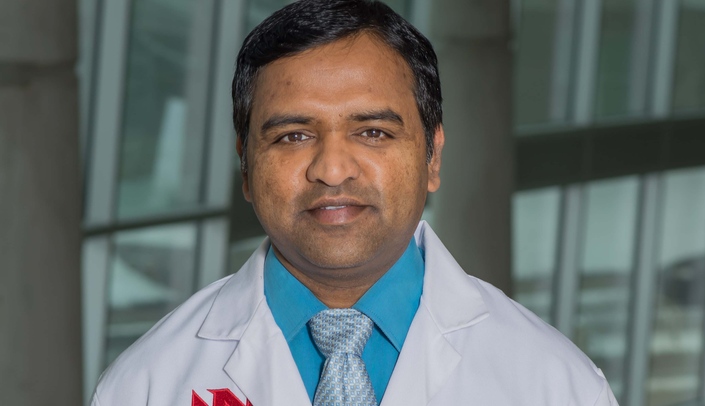Cancer is sneaky.
Anyone who has had cancer go into remission, only to have it return with a vengeance years later and spread to other organs, knows that.
Sneaky cancer stem cells are to blame and Moorthy Ponnusamy, Ph.D., assistant professor and research scientist in the University of Nebraska Medical Center Department of Biochemistry and Molecular Biology, has discovered a new biomarker to find them in pancreatic and ovarian cancer.
For his breakthrough research, Dr. Ponnusamy will be presented the 2018 Joseph P. and Harriet K. Gilmore Distinguished New Investigator Award at a ceremony at 2:30 p.m., Thursday March 15 in the Eppley Science Hall amphitheater.
“I am proud and honored to receive this award,” he said. “Junior researchers like me are encouraged to know that hard work is recognized.”
Dr. Ponnusamy arrived at UNMC in 2006. He was inspired by his mentor, Surinder Batra, Ph.D., chair & Stokes-Shackleford professor, biochemistry and molecular biology.
“Dr. Batra taught us that hard work never fails,” Dr. Ponnusamy said. “Without him, I may not have gotten so far.” Dr. Batra set him on the path of researching pancreatic cancer.
In 2009, Dr. Ponnusamy discovered the new role of PD2 in the maintenance of pluripotency and self-renewal of mouse embryonic stem cells. Dr. Ponnusamy is now investigating what impact PD2 has on the maintenance of drug-resistance and self-renewal of cancer stem cells in pancreatic and ovarian cancer.
“I expect this marker to be present in other cancers,” Dr. Ponnusamy said. Identification of cancer stem cell specific novel maintenance marker PD2 will provide critical information for the long-term goal of developing novel targeted therapy for cancer stem cells that will help to manage this lethal disease.”
We are Nebraska Medicine and UNMC. Our mission is to lead the world in transforming lives to create a healthy future for all individuals and communities through premier educational programs, innovative research and extraordinary patient care.
